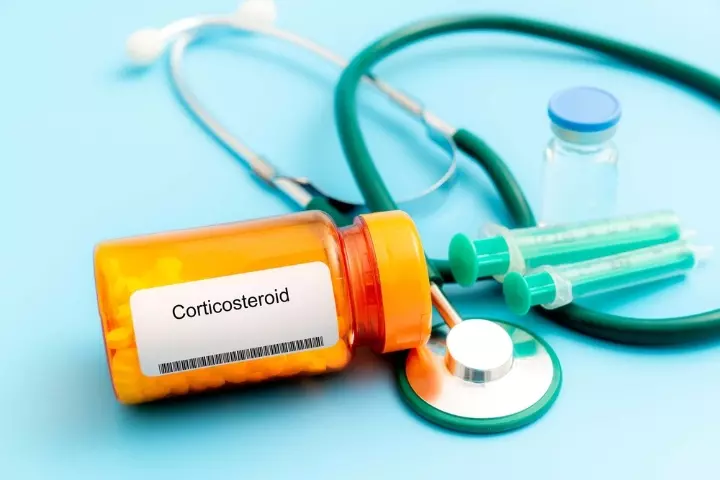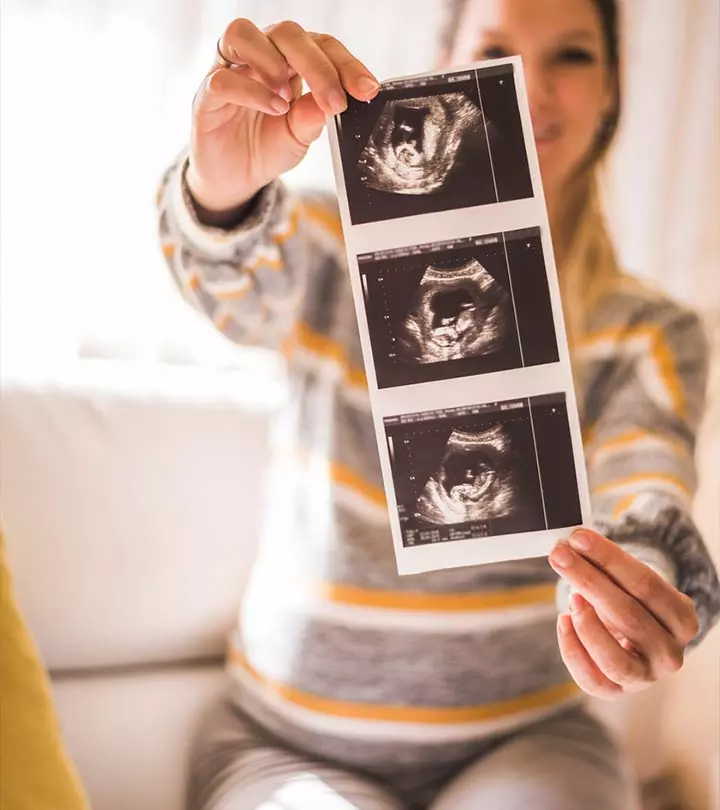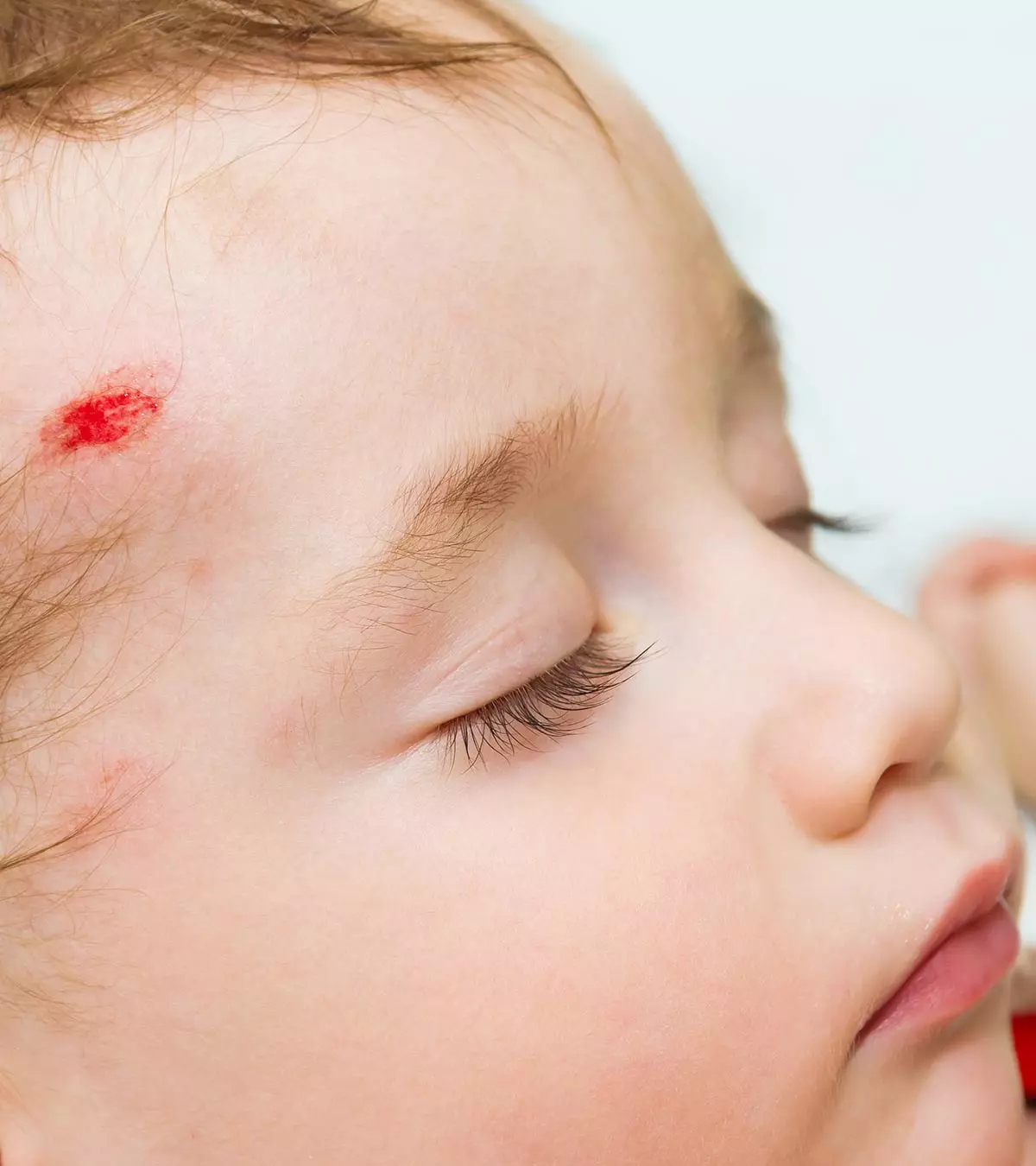
Image: Shutterstock
Crohn’s disease is commonly diagnosed in adolescents and adults from ages 15 to 30, and both men and women are equally susceptible (1). The condition, complications, tests, and interventions can impact fertility and pregnancy in women of childbearing age. Pregnant women with Crohn’s disease require special care to minimize the possible risks and complications.
Most women can have a normal pregnancy and healthy baby if Crohn’s condition is under control. Also, having a baby does not worsen Crohn’s. Maintaining remission with prescribed medications and a well-balanced diet, including prenatal supplements and regular physical activity, might increase the likelihood of having a healthy baby (2).
Read on to know more about the effects, safety, diagnosis, and treatments for Crohn’s disease in pregnancy.
Key Pointers
- Women with Crohn’s disease should discuss with healthcare providers and delay certain medications and surgery until childbirth.
- It is better to plan pregnancy when Crohn’s disease is in remission to have a pregnancy with minimal risks.
- It is ideal to seek preconception care to improve pregnancy outcomes and reduce the risk to the baby.
What Is Crohn’s Disease?

Crohn’s disease, a type of autoimmune disorder, is an inflammatory bowel disease (IBD) that can affect any part of the digestive tract, from the mouth to the anus. It also affects the small intestine and former parts of the large intestine. Fever, blood in stool, mouth sores, diarrhea, and abdominal pain are some possible symptoms of the condition.
The exact cause is yet unknown. There can be autoimmune or genetic etiologies, and Crohn’s may run in families. Smoking, a high-fat diet, NSAIDs, and certain antibiotics can increase the risk of Crohn’s disease. Although there is no cure, medications help manage symptoms during the flare. Bowel obstruction, malnutrition, reactive arthritis, the increased risk of cancer, and fistulaiAn abnormal connection between the skin of the anus and the end of the bowel formation are possible complications of Crohn’s disease (3).
How Will Pregnancy Affect Crohn’s Disease Symptoms?
The effect of pregnancy on Crohn’s disease symptoms vary in each woman. Those with flare-ups or in the active stages of this gastrointestinal disease at conception tend to have the symptoms throughout the pregnancy. Some may experience no symptoms or improvement of symptoms if conceived during remission. However, a few women reported having worsening Crohn’s symptoms during pregnancy.
Stopping Crohn’s medications can increase the risk of worsening the symptoms during pregnancy. You may stick to the treatment regimes and avoid triggers to reduce the severity of symptoms during pregnancy (4).
Holly, a mother who was diagnosed with Crohn’s disease at 16, shares her pregnancy experience in her blog and says, “My Crohn’s was definitely nowhere near being in ‘remission,’ & I was having a lot of issues with it when I found out I was pregnant. I immediately stopped taking all medication for it until I spoke to my gastroenterologist. …After speaking with my doctor and having him answer all of my questions, he put me back on the really mild medication, Asacol. Thankfully, my Crohn’s actually went into remission during my whole pregnancy. I could not believe it. I had never felt better in my entire life. I felt like a whole new woman. I didn’t need to run to the bathroom every 5 minutes, I didn’t have to miss events because of the disease, I was able to truly enjoy every second of being pregnant & not having to worry about the disease… Fast forward to now. G (my daughter) is 10 weeks today. And I’m still in remission from the disease. I’m amazed (i).”
Is It Safe To Get Pregnant With Crohn’s Disease?

Women with Crohn’s disease can conceive and have a healthy pregnancy with proper fetal health under the supervision of a gastroenterologist and obstetrician. You may inform your doctor about the plans for pregnancy to make necessary changes in medication doses and begin with prenatal supplementations to reduce the baby’s risk of developing congenital disabilities.
It is also advised to treat malnutrition related to Crohn’s before consumption. Healthy weight and nutritional status are essential for optimal growth and development of the baby and maternal immunity. Due to safety concerns, some diagnostic tests and medications need to be delayed during pregnancy. Although women with Crohn’s can have healthy pregnancies and babies, they are still considered high-risk pregnancies due to the chances of complications (5).
When Is The Best Time To Get Pregnant If You Have Crohn’s Disease?
The best time is to conceive during the remission for three to six months and when you are not on steroid medications. Usually, women with IBD have equal chances of conception during the remission period unless they have any complications (5).
Dr. Jacqueline Wolf, a physician in the Division of Gastroenterology, Hepatology, and Nutrition at Beth Israel Deaconess Medical Center says, “Because it affects them in their childbearing years, women need to know when it is safe to get pregnant,“

“Twenty years ago, women with this disease would be told that they shouldn’t have children or that this would affect their ability to have children,” adds Wolf. “Now most women can have a safe pregnancy and delivery if they go into pregnancy without the active disease (2).”
Most women conceiving in remission may continue to have the remission period throughout their pregnancy. It is not advisable to conceive in flares since the Crohns can be active during all trimesters, and there is a higher risk for adverse outcomes. Pregnancy in the active phase of the disease can also worsen symptoms and require more medications (5).
What Are Possible Pregnancy Complications With Crohn’s Disease?
According to a population-based study, Crohn’s disease increases the chances of poor pregnancy outcomes than other inflammatory bowel diseases such as ulcerative colitisiA chronic inflammatory bowel disease that irritates the colon and the rectum . Some women may experience pregnancy complications due to Crohn’s disease. Inadequate management of the disease and pregnancy in a flare can be the reason for complications.
The following pregnancy complications are possible in women with IBD, including Crohn’s disease (5):
- Preterm labor and birth
- Small for gestational age newborns
- Cesarean section deliveries

- Miscarriage or pregnancy loss
 Things to know
Things to knowPregnant women with IBD also tend to have an increased risk for other pregnancy and delivery complications and are likely to undergo cesarean delivery. In most studies, congenital disabilities are not shown to be directly associated with IBD. Crohn’s disease can increase the risk of fistulas (passages) and the collection of pus (abscesses) around the rectum and vagina. Cesarean-section deliveries are recommended if a woman has an active fistula or abscess around the vagina or rectum near the due date (5).
How Is Crohn’s Diagnosis And Monitoring Done During Pregnancy?
Inform the healthcare provider before undergoing investigations or tests to check the status of IBD. Although you have Crohn’s flare-ups, some investigations may be delayed until after childbirth or postpartum time period.
The following factors are considered for Crohn’s diagnosis in pregnancy (6):
- Ultrasound tests are safe anytime during pregnancy.
- MRI imaging is not done in the first trimester when the baby’s organs and organ systems develop.
- ColonoscopyiAn examination of the colon and the rectum using a thin, flexible tube with camera , gastroscopyiAn examination of the esophagus, stomach, and duodenum using a tube inserted in the mouth , and sigmoidoscopyiMinimally invasive examination of the lower colon and the rectum using a thin, flexible tube with camera are safe anytime during pregnancy.
- X-rays, barium X-raysiA type of radiographic X-ray examination used to diagnose abnormalities in the gastrointestinal tract , CT scansiMedical imaging technique that produces X-ray images of the internal parts of the body , and PET scansi An imaging test that reveals metabolic and biochemical functions of the tissues and organs are not usually recommended during pregnancy unless there is an unavoidable need since these tests involve radiation.
- Regular prenatal blood testing and ultrasounds are done at scheduled intervals.
The clinical guidelines recommend that healthcare providers order diagnostic evaluations for Crohn’s when it is needed during pregnancy. However, the tests are delayed to the second trimester or postpartum from the first or last trimesters to avoid risks.
Can You Continue Crohn’s Disease Treatment During Pregnancy?

Pregnancy and Crohn’s treatment should be well managed under the guidance of experts to avoid complications. There are some considerations and exceptions for drugs and their dosage during pregnancy. According to the Canadian Society of Intestinal Research, there are no drugs with no risks to the fetus; they can be low, moderate, or high risk (7).
The following medications are often prescribed for Crohn’s flares in pregnancy (8):
- Aminosalicylates such as sulfasalazine and mesalamine do not directly harm the fetus.
- CorticosteroidsiMedicines that may help reduce inflammation such as prednisone are low risk in pregnancy. However, it is recommended to conceive after a few months of stopping the steroids. Doses are reduced if a woman becomes pregnant during steroid therapy.
- Antibiotics are given if necessary. Quinolone antibiotics are not suggested due to their risks.
- Biologics such as infliximab and certolizumab are low risk and can be used in pregnancy and lactation. Vaccinations for infants can be delayed if the mother receives biologics during pregnancy due to the possible risk of infections after live vaccines (2).
- ImmunomodulatorsiSubstances that stimulate or suppress the immune system and help the body fight diseases such as azathioprine (Imuran) are low-risk drugs given in standard doses.
Most medications are safe for inflammatory bowel disease or IBS during pregnancy, except for two (8):
- Methotrexate
- Thalidomide (Celgene, Thalomid)
These medications are teratogenic and come under pregnancy category X. This means they have the potential to affect the embryo or fetal development negatively. These medications are used cautiously in women of childbearing age and are often discontinued months before pregnancy. Surgical treatments are recommended in pregnancy if the benefits outweigh the risks.
 Experts say
Experts sayWhat Is The Effect Of Surgery For Crohn’s Disease On Pregnancy?
Past bowel resections (removal surgery) for Crohn’s disease do not cause adverse effects on pregnancy. However, the outcomes may vary in each woman and depending on the type of resection. Some procedures may reduce the chance of conception, so women of childbearing age with Crohn’s should make informed decisions and delay or choose surgical procedures when it is an absolute requirement (5).
The following bowel resections are known to slightly decrease the fertility rates and adverse outcomes in pregnancy (5):
- Colostomies involve colon incisions to create an opening in the abdominal wall.
- Ileostomies, where damaged ileumiThe end of the small intestine is removed and connected to an artificial opening on the abdomen wall.
- J pouches (pelvic pouch or ileal pouch) is a type of ileoanal anastomosis (connection) made by two loops of the small intestine.
 Quick fact
Quick factAlthough modern abdominal surgeries and anesthesia pose minimal risks to the fetus, they are not safe. There is also an increased risk of prolapse or obstruction of ileostomy during pregnancy when the growing uterus exerts more pressure on the abdominal organs. Unless there is a risk to maternal health or unresponsiveness to medications, surgeries are postponed to postpartum.
Frequently Asked Questions
1. Should pregnant women be tested for Crohn’s disease?
Not all pregnant women need to be tested for Crohn’s disease during pregnancy. Doctors may recommend the tests if symptoms and tests are required. Pregnant women with Crohn’s disease flares may require diagnostic tests during pregnancy. Those in remission or who do not have the disease will not require tests or screening during pregnancy. Always inform your doctor about the disease and pregnancy to make safe decisions. Doctors may plan the tests based on the gestational week if needed.
2.Does Crohn’s get worse in pregnancy?
The severity of Crohn’s in pregnancy may vary in each woman. Studies show fewer relapses during pregnancy, or there were no significant differences. More evidence is needed to know the effects of pregnancy on Crohn’s disease (9).
3. Can I take folic acid with Crohn’s disease?
You should take folic acid as per your doctor’s recommendations from the preconception period throughout the pregnancy. Doctors may prescribe 2mg of folic acid daily for women taking sulfasalazine since it may interfere with folic acid absorption (10). In your regular diet, you may also consider including folic acid-rich foods, such as rice, fortified breakfast cereals, meat, avocado, and orange juice. These supplements are essential to prevent congenital anomalies in babies.
4. Can Crohn’s impact my fertility?
If your Crohn’s disease is inactive, it might not affect your fertility; however, if you have an active disease, it may impair your fertility. Nevertheless, if the disease goes into remission, fertility reverts (12).
5. Can I breastfeed with Crohn’s?
Some studies indicate that mothers with inflammatory bowel disease (IBD) such as Crohn’s may protect their babies against the early onset of the disease by breastfeeding. However, since different medicines pass into the breast milk at different rates, it is advisable to talk to your doctor about it. Moreover, as infants react differently to the drugs passed in the milk, pay attention to any worrying symptoms that arise (13).
6. Does Crohn’s disease lead to congenital disabilities in children?
It is not usually a problem to conceive with Crohn’s. However, if the condition remains active during pregnancy, it may cause birth issues such as miscarriage, premature delivery, or babies with low weight (14).
Crohn’s disease is not a contraindication for childbearing. However, the right plan and wise decisions can help you have better control of pregnancy outcomes. It is vital to get all prenatal and gastroenterologist visits on schedule since doctors may change or adjust the doses of medications depending on the gestational age and other factors. Pay attention to the nutrition status if you experience diarrhea during pregnancy or have other symptoms. Never hesitate to seek help from a counselor or support group when dealing with Crohn’s and pregnancy.
Infographic: Pregnancy Concerns With Crohn’s Disease
Crohn’s disease may lead to poor pregnancy outcomes if exacerbation occurs or if you are on certain medications. However, taking some prevention may help in a healthy pregnancy. The following infographic explains certain pregnancy complications that may occur due to Crohn’s disease and some preventative measures you can take.

Illustration: Momjunction Design Team
Illustration: Crohn’s Disease And Pregnancy: Symptoms Diagnosis And Treatment

Image: Dall·E/MomJunction Design Team
Pregnant and living with Crohn’s Disease? Learn what to do, how to manage remission, the best medications, and more in this informative video from Mass General Brigham.
Personal Experience: Source
MomJunction articles include first-hand experiences to provide you with better insights through real-life narratives. Here are the sources of personal accounts referenced in this article.
i. My Crohn’s disease post pregnancy.https://everydaysahollyday.wordpress.com/2013/01/14/my-crohns-disease-post-pregnancy/References
- Overview of Crohn’s Disease.
https://www.crohnscolitisfoundation.org/patientsandcaregivers/what-is-crohns-disease/overview - Dealing with Crohn’s Disease During Pregnancy.
https://www.bidmc.org/about-bidmc/wellness-insights/gastrointestinal-gi-health/2020/07/dealing-with-crohns-during-pregnancy - Crohn’s Disease.
https://medlineplus.gov/crohnsdisease.html - Inflammatory Bowel Disease.
https://mothertobaby.org/fact-sheets/inflammatory-bowel-disease-pregnancy/ - News from the IBD Help Center.
https://www.crohnscolitisfoundation.org/sites/default/files/legacy/assets/pdfs/pregnancyfactsheet.pdf - IBD and Pregnancy.
http://www.ibdclinic.ca/resources/?topic=preconception-pregnancy - IBD & Pregnancy: Meeting the Challenge.
https://badgut.org/information-centre/a-z-digestive-topics/ibd-pregnancy-meeting-the-challenge/ - Managing Crohn’s Disease during Pregnancy.
https://www.ncbi.nlm.nih.gov/pmc/articles/PMC5486164/ - Pregnancy and Breastfeeding.
https://crohnsandcolitis.org.uk/info-support/information-about-crohns-and-colitis/all-information-about-crohns-and-colitis/living-with-crohns-or-colitis/pregnancy-and-breastfeeding - Vitamins and Mineral Supplementation.
https://www.crohnscolitisfoundation.org/patientsandcaregivers/diet-and-nutrition/supplementation - Restellini S et al.; (2020); Update on the Management of Inflammatory Bowel Disease during Pregnancy and Breastfeeding.
https://www.karger.com/article/fulltext/502886 - Fertility and pregnancy in inflammatory bowel disease.
https://www.ncbi.nlm.nih.gov/pmc/articles/PMC4688654/#:~:text=Fertility%20can%20be%20expected%20to,delivery%20and%20low%20birth%20weight - PREGNANCY AND IBD.
https://crohnsandcolitis.org.uk/media/z51jdlo0/pregnancy-ed-8a-2023.pdf - News from the IBD help center
https://www.crohnscolitisfoundation.org/sites/default/files/legacy/assets/pdfs/pregnancyfactsheet.pdf
Community Experiences
Join the conversation and become a part of our nurturing community! Share your stories, experiences, and insights to connect with fellow parents.
Read full bio of Dr. Irene (Eirini) Orfanoudaki
Read full bio of Dr Bisny T. Joseph
Read full bio of Rebecca Malachi
Read full bio of Reshmi Das
















